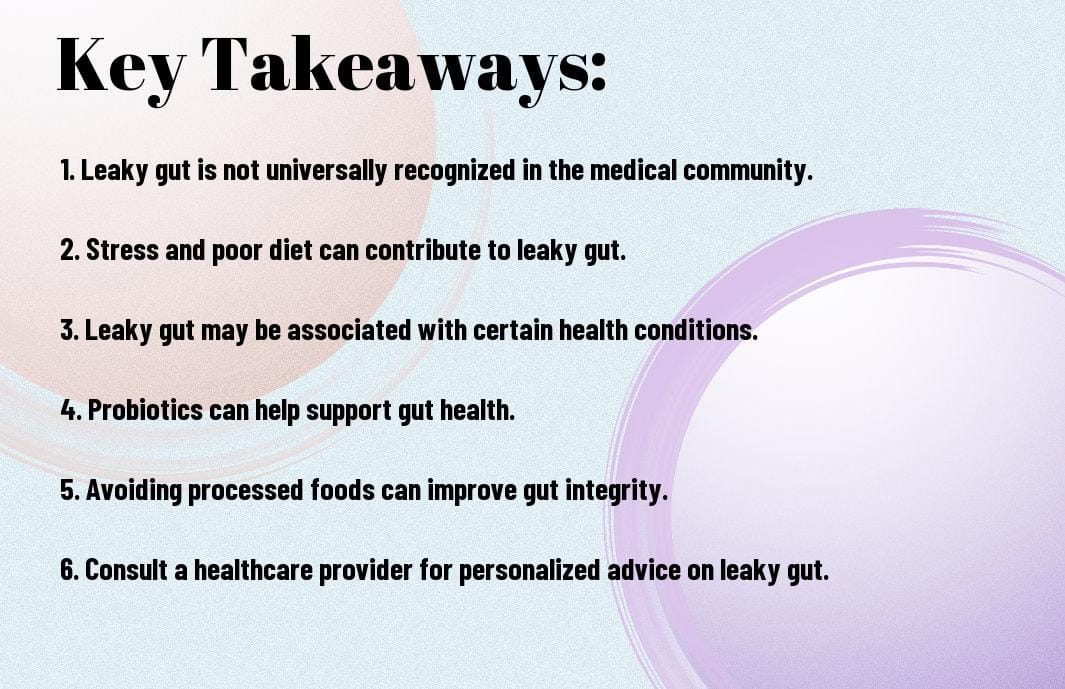Just as the interest in gut health grows, so do the myths about leaky gut syndrome, a condition often associated with a wide range of health issues. With conflicting information circulating, it’s important to separate fact from fiction. This post aims to address common misconceptions about leaky gut syndrome and provide clarity on the topic. For an unbiased look at whether leaky gut syndrome is a real condition, check out Is Leaky Gut Syndrome a Real Condition? An Unbiased Look.

Even though the digestive system is often taken for granted, it plays a crucial role in the overall well-being of a person. The gastrointestinal tract is a complex system responsible for breaking down food into nutrients that the body can absorb and use for energy. It comprises the mouth, esophagus, stomach, small intestine, large intestine, and rectum. Each part performs specific functions to facilitate digestion and absorption of nutrients.
For many years, the concept of intestinal permeability has been a subject of debate in the medical community. Intestinal permeability refers to the ability of the intestinal lining to control what passes through into the bloodstream. A healthy gut lining is selective about what it allows to pass through, ensuring that only nutrients are absorbed while harmful substances are kept out.
To dive deeper into the concept of intestinal permeability, it’s vital to understand that the intestinal lining is made up of epithelial cells held together by tight junctions. These tight junctions act as gatekeepers, regulating the passage of substances into the bloodstream. Disruption of these tight junctions can lead to increased intestinal permeability, allowing toxins, undigested food particles, and bacteria to leak into the bloodstream, triggering an immune response.
Diagnosis of leaky gut syndrome is often misused as a one-size-fits-all explanation for various health issues. While it is a real condition, it is important to understand that leaky gut is a specific gastrointestinal problem where the lining of the intestine becomes permeable, allowing toxins and undigested food particles to enter the bloodstream. It is not a blanket term for all digestive issues or symptoms.
Leaky gut is often falsely attributed as the root cause of all autoimmune diseases. While there is a strong connection between leaky gut and autoimmune conditions, it is not accurate to claim that leaky gut is the sole trigger for every autoimmune disease. It can certainly exacerbate autoimmune responses by promoting inflammation and impacting immune function, but it is just one piece of the complex autoimmune puzzle.
Keeping up with the latest research on leaky gut syndrome is crucial in understanding this complex condition. Any credible studies or evidenced insights can help us separate fact from fiction. Research suggests that a compromised gut barrier can lead to the translocation of harmful substances into the bloodstream, triggering an immune response and potentially contributing to various health issues.
Syndrome While leaky gut syndrome is still a topic of debate in the medical community, there are recognized medical conditions that are related to intestinal permeability. Syndromes such as celiac disease, irritable bowel syndrome, and inflammatory bowel disease have been linked to increased intestinal permeability. These conditions can exacerbate symptoms and lead to further complications if not managed effectively.
Evidenced insights point to the correlation between leaky gut and various medical conditions. While the exact mechanisms are still being studied, it is evident that intestinal permeability plays a significant role in the development and progression of certain health issues. Understanding these connections can help healthcare professionals provide more targeted treatment approaches for patients with leaky gut syndrome.
For optimal gut health, focusing on facts rather than fads is crucial. A diet rich in fiber from fruits, vegetables, and whole grains, along with probiotic-rich foods like yogurt and kefir, can support a diverse microbiome. It’s necessary to avoid excessive consumption of processed foods, sugar, and artificial sweeteners, as they can disrupt gut flora and contribute to inflammation.
Diet plays a significant role in gut health, but there are times when seeking medical advice is necessary. If you experience persistent digestive issues such as bloating, diarrhea, or abdominal pain, or notice changes in your bowel habits that last more than a few weeks, it’s important to consult a healthcare professional. They can help identify underlying causes and provide appropriate treatment to support your gut health.
Understanding when to seek medical advice can prevent potential complications and ensure that any gut-related issues are addressed promptly. It’s always better to seek professional guidance if your symptoms are persistent or severe, rather than attempting to self-diagnose or self-treat, which can sometimes worsen the condition.
Leaky Gut Syndrome has been surrounded by various myths and misconceptions, often leading to unnecessary fear and confusion. By debunking these myths and focusing on the scientific evidence available, we can better understand this condition and how to address it. It is crucial to rely on credible sources and consult with healthcare professionals for accurate information and personalized treatment plans. With a clearer understanding of Leaky Gut Syndrome, individuals can make informed decisions about their health and well-being, leading to a more proactive and effective approach to managing this condition.
This post contains affiliate links. I will earn a commission if you buy through my link.
Just as the interest in gut health grows, so do the myths about leaky gut syndrome, a condition often associated with a wide range of health issues. With conflicting information circulating, it’s important to separate fact from fiction. This post aims to address common misconceptions about leaky gut syndrome and provide clarity on the topic. For an unbiased look at whether leaky gut syndrome is a real condition, check out Is Leaky Gut Syndrome a Real Condition? An Unbiased Look.

Even though the digestive system is often taken for granted, it plays a crucial role in the overall well-being of a person. The gastrointestinal tract is a complex system responsible for breaking down food into nutrients that the body can absorb and use for energy. It comprises the mouth, esophagus, stomach, small intestine, large intestine, and rectum. Each part performs specific functions to facilitate digestion and absorption of nutrients.
For many years, the concept of intestinal permeability has been a subject of debate in the medical community. Intestinal permeability refers to the ability of the intestinal lining to control what passes through into the bloodstream. A healthy gut lining is selective about what it allows to pass through, ensuring that only nutrients are absorbed while harmful substances are kept out.
To dive deeper into the concept of intestinal permeability, it’s vital to understand that the intestinal lining is made up of epithelial cells held together by tight junctions. These tight junctions act as gatekeepers, regulating the passage of substances into the bloodstream. Disruption of these tight junctions can lead to increased intestinal permeability, allowing toxins, undigested food particles, and bacteria to leak into the bloodstream, triggering an immune response.
Diagnosis of leaky gut syndrome is often misused as a one-size-fits-all explanation for various health issues. While it is a real condition, it is important to understand that leaky gut is a specific gastrointestinal problem where the lining of the intestine becomes permeable, allowing toxins and undigested food particles to enter the bloodstream. It is not a blanket term for all digestive issues or symptoms.
Leaky gut is often falsely attributed as the root cause of all autoimmune diseases. While there is a strong connection between leaky gut and autoimmune conditions, it is not accurate to claim that leaky gut is the sole trigger for every autoimmune disease. It can certainly exacerbate autoimmune responses by promoting inflammation and impacting immune function, but it is just one piece of the complex autoimmune puzzle.
Keeping up with the latest research on leaky gut syndrome is crucial in understanding this complex condition. Any credible studies or evidenced insights can help us separate fact from fiction. Research suggests that a compromised gut barrier can lead to the translocation of harmful substances into the bloodstream, triggering an immune response and potentially contributing to various health issues.
Syndrome While leaky gut syndrome is still a topic of debate in the medical community, there are recognized medical conditions that are related to intestinal permeability. Syndromes such as celiac disease, irritable bowel syndrome, and inflammatory bowel disease have been linked to increased intestinal permeability. These conditions can exacerbate symptoms and lead to further complications if not managed effectively.
Evidenced insights point to the correlation between leaky gut and various medical conditions. While the exact mechanisms are still being studied, it is evident that intestinal permeability plays a significant role in the development and progression of certain health issues. Understanding these connections can help healthcare professionals provide more targeted treatment approaches for patients with leaky gut syndrome.
For optimal gut health, focusing on facts rather than fads is crucial. A diet rich in fiber from fruits, vegetables, and whole grains, along with probiotic-rich foods like yogurt and kefir, can support a diverse microbiome. It’s necessary to avoid excessive consumption of processed foods, sugar, and artificial sweeteners, as they can disrupt gut flora and contribute to inflammation.
Diet plays a significant role in gut health, but there are times when seeking medical advice is necessary. If you experience persistent digestive issues such as bloating, diarrhea, or abdominal pain, or notice changes in your bowel habits that last more than a few weeks, it’s important to consult a healthcare professional. They can help identify underlying causes and provide appropriate treatment to support your gut health.
Understanding when to seek medical advice can prevent potential complications and ensure that any gut-related issues are addressed promptly. It’s always better to seek professional guidance if your symptoms are persistent or severe, rather than attempting to self-diagnose or self-treat, which can sometimes worsen the condition.
Leaky Gut Syndrome has been surrounded by various myths and misconceptions, often leading to unnecessary fear and confusion. By debunking these myths and focusing on the scientific evidence available, we can better understand this condition and how to address it. It is crucial to rely on credible sources and consult with healthcare professionals for accurate information and personalized treatment plans. With a clearer understanding of Leaky Gut Syndrome, individuals can make informed decisions about their health and well-being, leading to a more proactive and effective approach to managing this condition.
This post contains affiliate links. I will earn a commission if you buy through my link.
